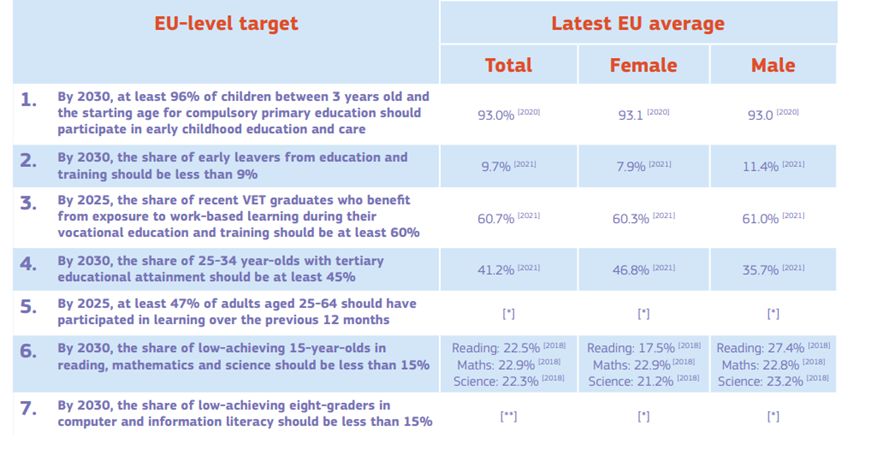
Building the European Education Area: despite progress on EU-level education targets, challenges remain on equity and attractiveness of the teaching profession
On 18 November 2022, the European Commission published its Report on progress towards the achievement of the European Education Area(EEA). The report takes stock of the ongoing EU initiatives aimed at attaining the EU-level targets in education and training. It also sets out the tasks ahead of 2025 which is the deadline for the Member States to achieved the goals of the EEA. The EEA progress report is Complementing the EEA progress report, is the 2022 Education and Training Monitor, which tracks the development towards achieving the EU-level targets with data from the Member States. The report forms part of the mid-term review process, while the European Commission presents the full report on the national implementation of the European Education Area in 2025. According to the Report only 1 of the 7 EU-level targets has been concretely achieved, namely that at least 60% of recent VET graduates should have been exposed to work-based learning by 2025:

The participation target (96%) in early childhood education (ECE) was only reached in Belgium, Denmark, France, Ireland and Spain. On the other hand, the share of early school leavers continued to decrease in 16 Member States despite the COVID-19 pandemic including Croatia (2.4%), Slovenia (3.1%), Greece (3.2%) and Ireland (3.3%) as top performers. Likewise, there is a steady growth of tertiary educational attainment rate up with 13 Member States surpassing it in 2021, such as Luxembourg (62.6%), Ireland (61.7%), Cyprus (58.3%), Lithuania (57.5%) and the Netherlands (55.6%).
Regarding further actions required to achieve the EEA by 2025, the Commission is preparing six EU-level strategic initiatives on digital transition, learning mobility, and on higher education. ETUCE welcomes that the European Commission plans to strengthen the governance aspects of the implementation process also with the involvement of the social partners and to further discuss the outcomes during the 5thEducation Summit.
The Report underlines that longer-term systemic efforts should be put in place to improve equity in education and to tackle teacher shortages: teacher supply and demand; professional development; structures and working conditions; and emotional well-being and motivation). In this regard, ETUCE, both with its policy paper and its upcoming campaign on Attractiveness of the Teaching Profession, emphasized the need to take actions.
Further information:






